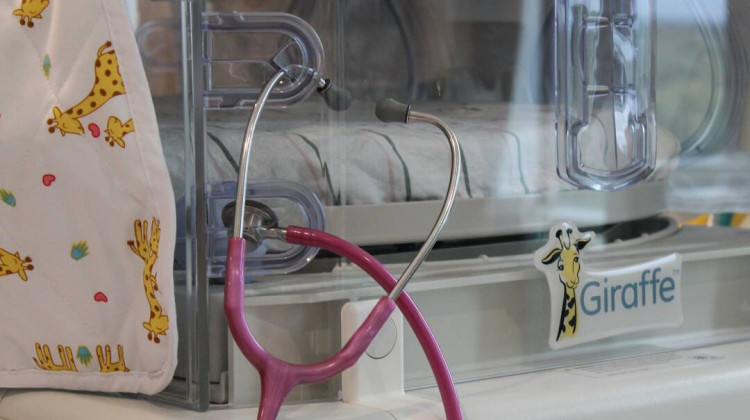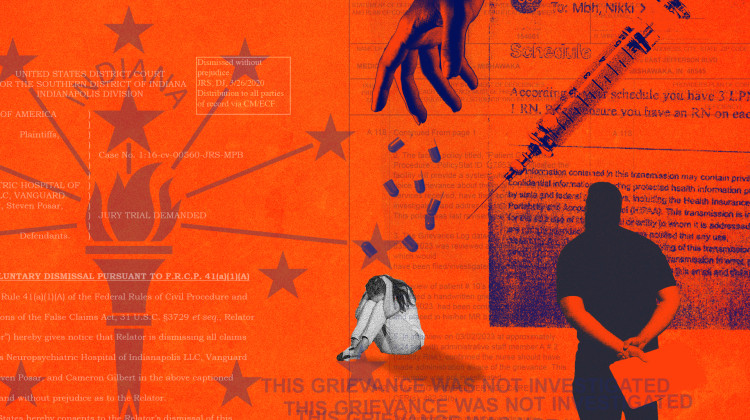
Health experts say breast self exams should not replace regular breast examinations by health care providers –– every three years for women in their 20s and 30s, and every year for women in their 40s and older –– as well as mammograms.
(National Cancer Institute/ Unsplash)Breast cancer is the most common cancer among women nationwide. A woman in the U.S. has a 12 percent risk of developing breast cancer in her lifetime. But women in their 20s and 30s may not think they are at risk.
Mammograms are typically not part of the preventative care offered to women under 40 because their risk is lower than older women.
A new campaign spearheaded by Community Health Network urges young women to commit to one breast self exam every month. While self exams should not take the place of regular women’s wellness care, health experts say they have value –– to help familiarize women with their own breasts to be able to detect any changes and report them promptly.
Lauren Dages knows the importance of self exams.
After she stopped breastfeeding her son, she could feel a small lump that wouldn’t go away every time self-examined her breasts. She was in her early 30s and thought she was too young for cancer. She also didn’t have family history.
Dages owns a hair salon. One day, a client who’s a health care provider offered to check her. She felt the lump and referred Dages to get a mammogram.
“And that day they rushed me to get an emergency biopsy,” she said. “And a couple of days later, they called me and said yes, I in fact do have breast cancer.”
Dages was diagnosed with Stage 2 breast cancer, close to developing Stage 3 if she hadn’t caught it with her self exams.
Markeeta Morrow, also in her early 30s, had a similar experience. Morrow says she’s been checking her breasts regularly since she was 15.
“I found out that I had breast cancer at the age of 33. And the only reason I found out was because I'm a person who is very in touch with their body,” Morrow said.
She was diagnosed with Stage 2 triple negative breast cancer, which is an aggressive type of cancer that disproportionately affects Black women.
Dages and Morrow both started their months-long treatment journey and are now nearly cancer free. They believe that early detection played a role in their health outcomes.
Community Health Network’s “Commit to One” campaign encourages women to set a date for a self exam. Dages suggests the first day of the month, or on the last day of every period.
“We're trying to really push it at the beginning of the year – new year, new goals,” Morrow said.
Health experts say that women can start doing breast self exams at age of 20. The U.S. Preventive Services Task Force suggests that these self-exams do not lower death risk from breast cancer, and that breast self-exams should not substitute breast examination by a health care provider.
Dages said as a hair salon owner, she will be more intentional in sparking conversations with her mostly-female clientele around the importance of being aware of any changes to their breasts.
According to the CDC, if you are under the age of 45, you may have a higher risk for breast cancer if:
- You have a family history of breast cancer before the age of 45 or ovarian cancer at any age.
- You have Ashkenazi Jewish heritage.
- You received breast or chest radiation therapy during childhood or early adulthood.
- You have had breast cancer or other breast health problems such as lobular carcinoma in situ, ductal carcinoma in situ , atypical ductal hyperplasia or atypical lobular hyperplasia.
- You have been told that you have dense breasts on a mammogram.
According to the CDC, some warning signs of breast cancer are:
- A new lump in the breast or armpit.
- Breast thickening or swelling.
- Breast skin irritation or dimpling.
- Redness or flaky skin around the nipple or te breast.
- Nipple pulling or pain.
- Nipple discharge other than breast milk, including blood.
- Any change in breast size or shape.
- Breast pain.
This story comes from a reporting collaboration that includes the Indianapolis Recorder and Side Effects Public Media — a public health news initiative based at WFYI. Contact Farah at fyousry@wfyi.org. Follow on Twitter: @Farah_Yousrym.
 DONATE
DONATE





 View More Articles
View More Articles




 Support WFYI. We can't do it without you.
Support WFYI. We can't do it without you.